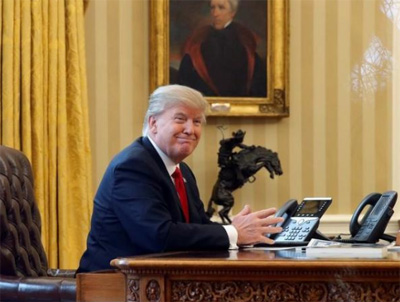
It’s only been two days since President Trump signed an executive order putting a temporary ban on refugees from seven countries with active terrorism that could threaten the United States, and already he is working on improving the conditions for migrants in Syria by gaining and agreement from the Saudi King to pitch in.
According to Reuters, on a Sunday phone call with Saudi Arabia’s King Salman President Trump brought up the topic of safe zones in Syria and Yemen where refugees or migrants who are fleeing the conflict can seek shelter, rather than having to immigrate to other continents.
Trump had repeatedly brought up safe zones during his campaign as an alternative to mass immigration of refugees from the war torn Middle East. Shortly after winning the election in November, Trump suggested we will build a “big beautiful safe zone” (not to be confused with the big beautiful border wall) in Syria where people can go to avoid the destruction caused by ISIS.
Now, only hours ago, it appears the first steps towards establishing safe zones in the Middle East has taken place, as President Trump gained commitment from the King of Saudi Arabia to start supporting the cause.
Saudi Arabia’s King Salman, in a phone call on Sunday with U.S. President Donald Trump, agreed to support safe zones in Syria and Yemen, a White House statement said.
Trump, during his presidential campaign last year, had called for Gulf states to pay for establishing safe zones to protect Syrian refugees.
A statement after the phone call said the two leaders agreed on the importance of strengthening joint efforts to fight the spread of Islamic State militants.
“The president requested and the King agreed to support safe zones in Syria and Yemen, as well as supporting other ideas to help the many refugees who are displaced by the ongoing conflicts,” the statement said.
The Saudi Press Agency, in its readout of the call, made no specific mention of safe zones. It said the two leaders had affirmed the “depth and durability of the strategic relationship” between the two countries.
A senior Saudi source told Reuters the two leaders spoke for over an hour by telephone and agreed to step up counter-terrorism and military cooperation and enhance economic cooperation. But the source had no word on whether the two leaders discussed Trump’s order to put a four-month hold on allowing refugees into the United States and temporarily ban travelers from Syria and six other Muslim-majority countries.
The source said Saudi Arabia would enhance its participation in the U.S.-led coalition fighting to oust Islamic State from its strongholds in Iraq and Syria.
The White House statement said the two leaders also agreed on the need to address “Iran’s destabilizing regional activities.” SPA also mentioned Trump and the King had similar visions on “confronting whomever seeks to destabilize security and stability in the region and interfere in the affairs of other countries,” an apparent reference to Riyadh’s arch-foe Iran.
Both countries share views about Iranian policies in the region, the Saudi source said, suggesting Trump agreed with Riyadh’s suspicion of what it sees as Tehran’s growing influence in the Arab world. Iran denies it meddles in Arab countries.
The White House statement said the two also discussed what it called an invitation from the king for Trump “to lead a Middle East effort to defeat terrorism and to help build a new future, economically and socially,” for Saudi Arabia and the region.
The two also discussed the Muslim Brotherhood, the senior Saudi source said, adding in a reference to the late al Qaeda leader, “it was mentioned that Osama bin Laden was recruited at an early stage” by the organization.
Egypt, Saudi Arabia and the United Arab Emirates designated the Brotherhood as a terrorist organization. Riyadh fears the Brotherhood, whose Sunni Islamist doctrines challenge the Saudi principle of dynastic rule, has tried to build support inside the kingdom since the Arab Spring revolutions.
U.S. officials and people close to Trump’s transition team have said a debate is under way in the Trump administration about whether the United States should also declare the Brotherhood a terrorist organization and subject it to U.S. sanctions.
Who would have thought that refugees can still find safety in their own or surrounding countries without having to make a trip half way across the world to a foreign land, where they don’t speak the language or know the culture, and can still leave peacefully. It also protects the people of America as well, since it will eliminate the risk involved with mass migration of terrorist infiltrating the movement and causing mass harm to Western populations.
President Trump is proving to have a concise long term strategy, and is not the reckless “bull in a china shop” the media tries to make him out to be, also showing his sincere concern for the suffering of a foreign people.
With safe zones in Syria likely materializing in the not so distant future, it will once again show the world what a government can accomplish with the right leader (not a politician) at the helm.